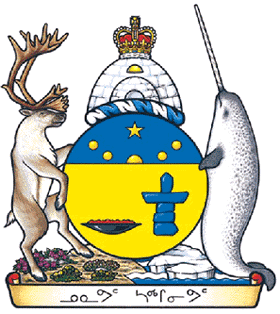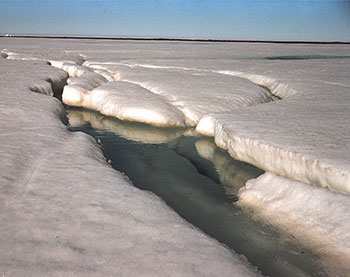|
|
|
|
|
|
|
|
Today's Congressional Action:
The Senate is not in session. The House is expected to consider non-Arctic legislation.
|
 Nunavut to Spend More This Year on Health, Social Assistance. Nunavut to Spend More This Year on Health, Social Assistance. Though Nunavut's economy will grow by only 1.2 per cent during the upcoming fiscal year, the Government of Nunavut plans to spend more on health care and social assistance in 2016-17, Finance Minister Keith Peterson said in his Feb. 25 budget speech. That social and health spending will include a "new one-year, fully funded action plan" under the GN's suicide prevention strategy, Peterson said. Nunatsiaq Online
[Opinion] What's Happening in the Arctic is Transforming How We Transport Goods. The Arctic is thawing even faster than lawmakers can formulate new rules to prevent the environmental threat of heavy fuel oil pollution from ships plying an increasingly popular trade route. Average Arctic temperatures are rising twice as fast as elsewhere in the world and the polar ice cap's permanent cover is shrinking at a rate of around 10 percent per decade. By the end of this century, summers in the Arctic could be free of ice. Port News
Conference on Aging Addresses Elders' Needs. Elders and administrators converged on Anchorage last week, to discuss ways to better serve the aging population of the the Aleutian and Pribilof Islands at the first-ever Tribal Eldercare Services Summit. The conference's organizers were pleased with the three-day event, as it wound down Friday afternoon. "We're quite happy," said Dimitri Philemonof, president and chief executive officer of the Aleutian Pribilof Islands Association, which co-cosponsored the summit along with the Eastern Aleutians Tribes. The Arctic Sounder
 Arctic Thaw Opens Shipping Waterways, Risks to Environment. Arctic Thaw Opens Shipping Waterways, Risks to Environment. The Arctic is thawing even faster than lawmakers can formulate new rules to prevent the environmental threat of heavy fuel oil pollution from ships plying an increasingly popular trade route. Average Arctic temperatures are rising twice as fast as elsewhere in the world and the polar ice cap's permanent cover is shrinking at a rate of around 10 percent per decade. By the end of this century, summers in the Arctic could be free of ice. Reuters
At the Mouth of the Kusko, a Pioneering Wind System. In rural Alaska, one problem thwarts a thousand good ideas: the high cost of energy. From generating electricity to heating homes to fueling boats and snowmachines, energy expenses eat into budgets, are a barrier to business and add to the prohibitive cost of water and sewer systems. Alaska Public Radio
|
Legislative Action
No Arctic legislation was formally considered yesterday.
|
|
Future Events
5th Annual Fletcher Opening Arctic Conference, March 12, 2016. The Opening Arctic Conference builds on the Fletcher School's Warming Arctic International Inquiry series, to bring together high-level thought leaders from across disciplines, Fletcher's hallmark. Staged annually, Fletcher's event continues to address the foreign policy, economic, environmental and security implications of the opening Arctic, while dispelling myths.
** New this week** Bridging the Future of Arctic Social Science Research, March 23-25, 2016 (Fairbanks, Alaska, USA). The event is sponsored by Arctic Horizons. The Fairbanks workshop aims to explore recent advances and innovations in indigenous science and scholarship in the circumpolar north and its neighbors. The workshop will bring together indigenous experts and researchers from diverse academic and cultural backgrounds to explore the role and contributions of indigenous frameworks and knowledge systems in advancing fields of science and informing global solutions.
** New this week** Bridging the Future of Arctic Social Science Research, March 31-April 2, 2016 (Fairbanks, Alaska, USA). The event is sponsored by Arctic Horizons. The Juneau Workshop, organized in collaboration with University of Alaska Southeast Department of Social Science, aims to explore the contributions and potentials of Arctic social sciences in the emerging synergies that involve humanities, natural sciences, and engineering. The connections we attempt to foster reach mainly into two directions within the recent history of Arctic research.
15th Annual Arctic Health Science Seminar, April 1, 2016 (Anchorage, Alaska, USA). The American Society for Circumpolar Health will host the 15th Annual Arctic Health Science Seminar in Anchorage, Alaska. This event will include the annual meeting of the American Society for Circumpolar Health, the Robert Fortuine Memorial lecture, and the Albrecht Milan Foundation will provide the Albrecht-Milan Emerging Professional Award to one of the Arctic Health Science Seminar presenters. The call for abstracts is open through Monday February 29, 2016.
** New this week** The American Arctic: The United States as an Arctic Power in Science, Technology and Security, April 4, 2016 (San Francisco, CA, USA). The Association of American Geographers will host a panel discussion on the American Arctic. In 2015 the United States assumed the chairmanship of the Arctic Council. In recent years, the Federal government began to pay closer attention to the Arctic owing to dramatic environmental and social changes and growing economic interest in the region's vast resources. President Obama became the first sitting US President to visit the Arctic this August. US Arctic Research Commission Chair Fran Ulmer is expected to be a panelist.
** New this week** Bridging the Future of Arctic Social Science Research, April 14-16, 2016 (Cedar Fall, Idaho, USA). The event is sponsored by Arctic Horizons. This workshop will gather a diverse group of scholars to discuss the state-of-the art in Arctic social sciences and develop visioning scenarios for the future of social science research in the Arctic. The core topics will parallel discussions held at other regional workshops (Portland, OR and Providence, RI), which include: social sciences research and climate change; interdisciplinary research in the Arctic; social sciences and humanities in the Arctic, and applied social sciences research.
Alaska Rural Energy Conference, April 26-28, 2016 (Fairbanks, Alaska, USA). The Alaska Rural Energy Conference is a three day event offering a large variety of technical sessions covering new and ongoing energy projects in Alaska, as well as new technologies and needs for Alaska's remote communities. Building on the growing success, the Alaska Energy Authority and the Alaska Center for Energy and Power have joined forces again to organize and sponsor the 10th annual Alaska Rural Energy Conference.
14th IATS Seminar, June 19-25, 2016 (Bergen, Norway). The University of Bergen (UiB) is honored to host the 14th IATS Seminar in Bergen, Norway, from Sunday 19 to Saturday 25 June 2016 in co-operation with the Network for University Co-operation Tibet-Norway, an academic network with the universities of Oslo, Bergen and Tromsų as partners. The convenor is Professor Hanna Havnevik, Department of Culture Studies and Oriental Languages, University of Oslo, and Chair of the Network.
** New this week** Bridging the Future of Arctic Social Science Research, September 23-24, 2016 (Monticello, Rhode Island, USA). The event is sponsored by Arctic Horizons. The event will reassemble the members of the National Steering Committee and a small but diverse selection of representatives from the five regional workshops, to total about 15 people. The aim will be to identify and synthesize the core threads of the previous workshops and public contributions proffered between workshops. The target output for the workshop will be a final report draft and outline of steps leading to the final report release in June 2016. The Jefferson Institute will manage production of the publication.
Inuit traditions are a repository of Inuit culture and a primary expression of Inuit identity. The theme for the 2016 Inuit Studies Conference invites Elders, knowledge-bearers, researchers, artists, policy-makers, students and others to engage in conversations about the many ways in which traditions shape understanding, while registering social and cultural change. The institutional hosts of "Inuit Traditions," Memorial University of Newfoundland and the Nunatsiavut Government, invite you to contribute to an exchange of knowledge to be held in St. John's, Newfoundland and Labrador, October 7-10, 2016. Presentations on all aspects of Inuit studies will be welcome.
|
|

  
4350 N. Fairfax Drive, Suite 510
Arlington, VA 22203, USA
External links in this publication, and on the USARC's World Wide Web site ( www.arctic.gov) do not constitute endorsement by the US Arctic Research Commission of external Web sites or the information, products or services contained therein. For other than authorized activities, the USARC does not exercise any editorial control over the information you may find at these locations. These links are provided consistent with the stated purpose of this newsletter and the USARC Web site.
|
|
|
|
|
|
|
|
|